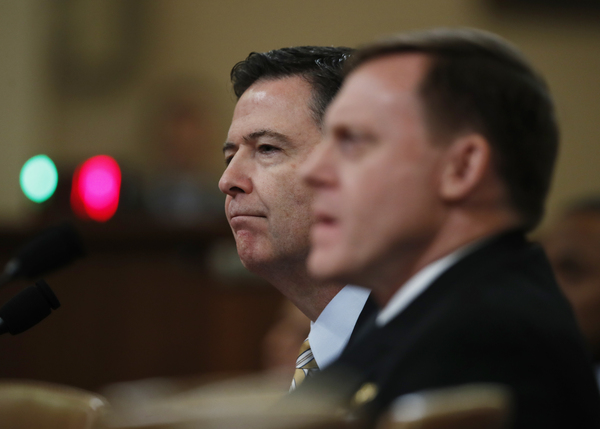 FBI Director James Comey, left, and National Security Agency Director Michael Rogers, testify on Capitol Hill (AP Photo/Manuel Balce Ceneta) Cynicism in the swamp If you were to ask someone in Washington what Monday's House Intelligence Committee hearing was about, you might find two competing narratives. One was about alleged Russian interference in the U.S. election. And the other was about leaks. President Trump himself fired off a series of tweets in the early hours of the morning that suggested the leaks coming from inside the government were the "real story." Then his Republican colleagues picked up the thread at the hearing, with South Carolina Rep. Trey Gowdy even going so far as to name people with high-ranking positions in the Obama administration, one after the other, and ask if they could be leakers. That narrative struck many observers as absurd — especially given Gowdy's own history on the Benghazi Committee, which was known to leak information to journalists. And those pushing from the other side certainly had plenty of ammunition. Not only did the FBI's Comey suggest he had "no evidence" to support President Trump's claim that Obama had ordered Trump Tower to be wiretapped, he also admitted that there was counterintelligence investigation into the Russian government’s efforts to interfere in the 2016 election — and that the probe was looking at links between Trump campaign associates and the Russian government. It remains to be seen which one of these narratives has more momentum, but the impact of both will likely matter still. As the Committee Chairman Devin Nunes, a Californian Republican who had worked with Trump during the campaign, put it, there was now a "big gray cloud" over some of the current administration’s leaders, including the President himself. Aside from eroding domestic trust in the government, the revelations have complicated relations with Russia, making it hard to imagine a closer relationship with Moscow like the one Trump talked about on the campaign trail. And talk of leaks could cast a cloud of mistrust over the U.S. intelligence community, too. If, as Comey said Monday, Russia seeks to influence the 2020 or 2018 elections, they may find it easier than ever. — Adam Taylor  Moscow, on Monday. (AP Photo/Ivan Sekretarev) As Adam Taylor outlined above, the narrative around Russian interference in American politics is, like much else, sharply divided on the domestic front. But how does it look on the streets of Moscow? The stereotype of the brainwashed Russian is outdated, says our Moscow bureau chief, David Filipov. Below, he answers the question: "How do Russians — everyday Russians — view their country’s reemergence as America’s favorite boogeyman?" "To understand how ordinary Russians feel about the reemergence of their country as America’s favorite boogeyman, start with how they feel about their own leaders. "Most Russians get most of their information from state-controlled TV, but they’ve been lied to enough that they don’t completely trust anything it says. "The Kremlin constantly tells Russians when to be proud and what to be proud of — for example, government employees were ordered to attend Saturday’s three-year anniversary of the annexation of Crimea. Privately Russians share little of the official version of national pride. But they are proud of what their countrymen can accomplish. "So, when Russia’s leaders say they have nothing to do with hacking U.S. elections, Russians’ natural reaction is to disbelieve them. But then, when Americans say Moscow tipped the elections in favor of President Trump, Russians say 'We have the best hackers' and 'Why is America so weak?' "Per the Kremlin narrative, the investigation into President Trump’s ties to Russia is a cartoonish manifestation of Russophobia wrapped in a conspiracy to prevent improving U.S.-Russian ties. "No doubt these attitudes have rubbed off on the public. But Russians possess a natural skepticism and a penchant for morbid humor in the face of what they’re being told. "Russians are having fun with the idea that they are feared. The question 'Have you ever met with Kislyak?' became a one-line joke in Moscow after senior Trump officials got in hot water for not reporting their meetings with Russia’s ambassador to Washington. T-shirts, buttons and refrigerator magnets now depict fearsome Russian bears. Memes? All over the place. "Behind the humor is a sense of consternation. Any American who has talked politics with a Russian hears two questions. "'Why are you so afraid of us?' And, 'Why do you blame us for everything?'" |